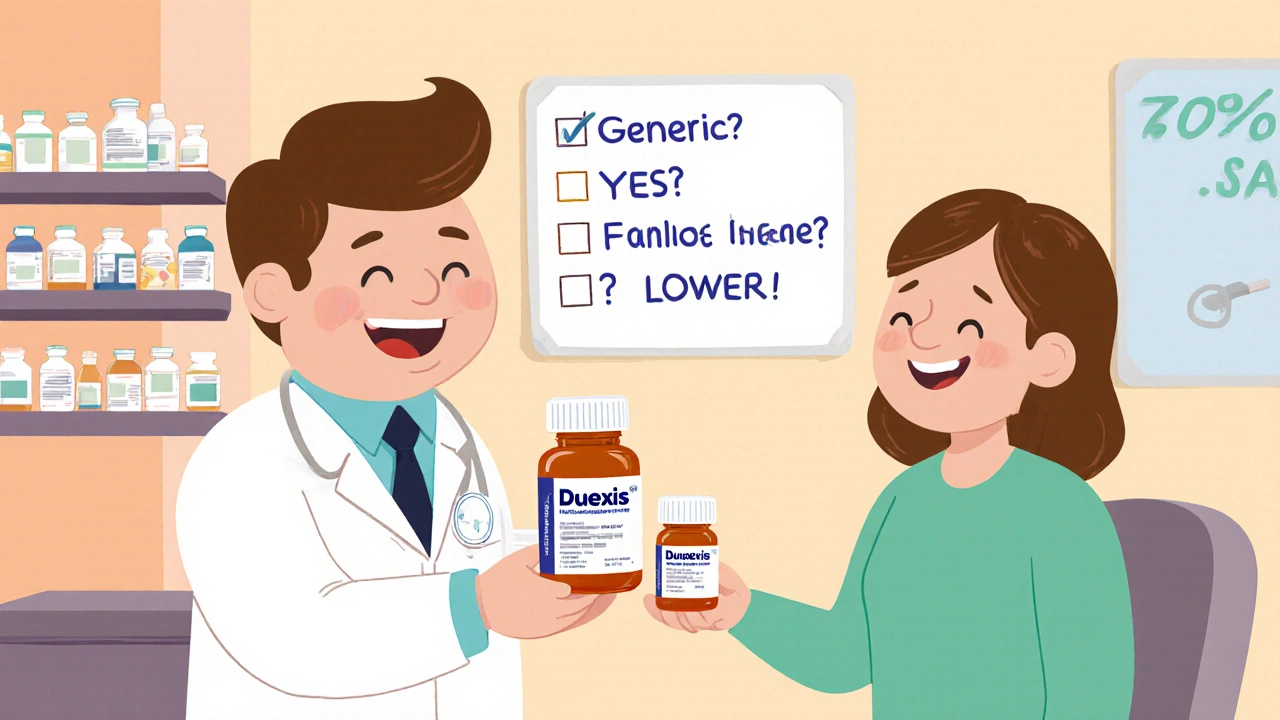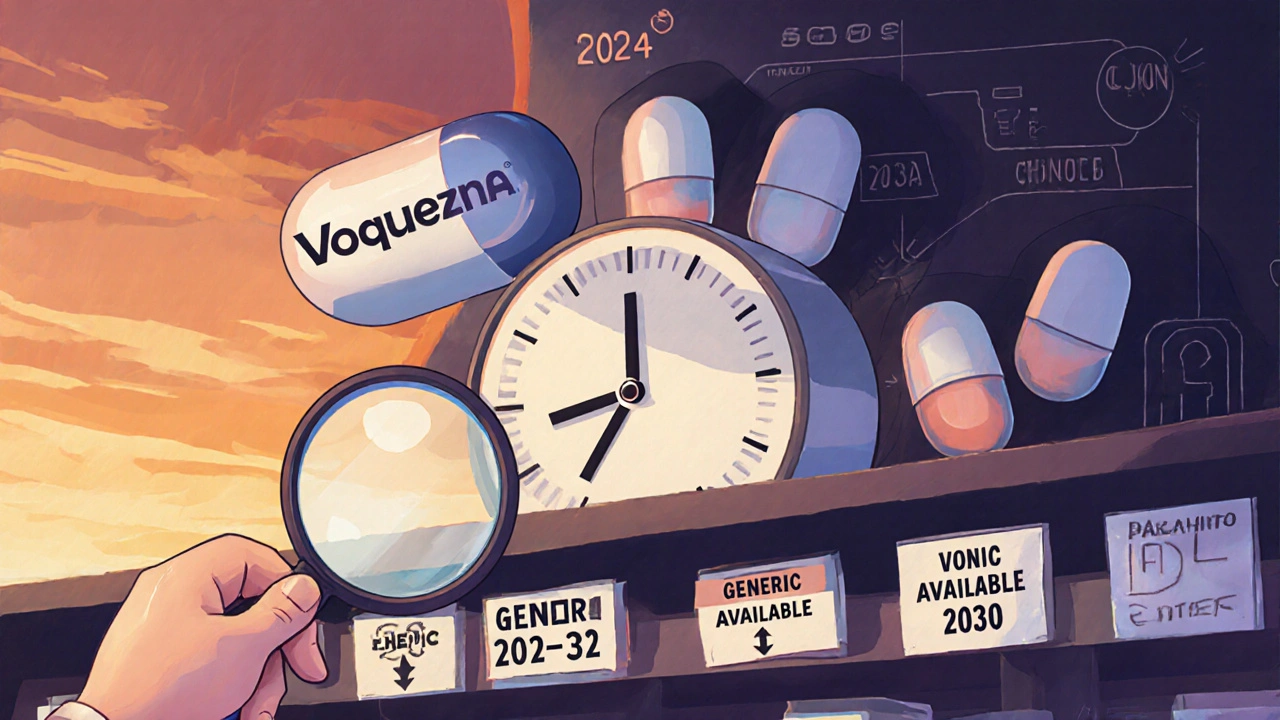Gastrointestinal Combination Products: Generic Availability and Alternatives
 Nov, 19 2025
Nov, 19 2025
When you’re dealing with stomach pain, acid reflux, or ulcers, doctors often reach for combination pills - not because they’re fancy, but because they work better together. Think of it like a team: one drug shuts down acid, another kills bacteria, or one reduces pain while another protects your stomach lining. These gastrointestinal combination products are designed to simplify treatment, cut down on pill counts, and improve outcomes. But here’s the real question: are generics available? And if not, what else can you use?
What Are Gastrointestinal Combination Products?
These are pills or capsules that contain two or more active ingredients meant to treat digestive issues at once. They’re not just random mixes - each combo is carefully tested to make sure the ingredients work safely together. For example, one common combo is ibuprofen and famotidine. Ibuprofen reduces pain and inflammation, but it can irritate your stomach. Famotidine lowers stomach acid, so it protects your lining. Together, they let you manage arthritis pain without triggering ulcers.
Another big category is H. pylori eradication therapy. This infection causes most peptic ulcers. To kill it, you need at least two antibiotics plus a proton pump inhibitor (PPI). A typical regimen might include omeprazole (20 mg), amoxicillin (1,000 mg), and clarithromycin (500 mg), taken twice daily for 10-14 days. These aren’t just suggestions - they’re based on clinical guidelines from the American College of Gastroenterology.
Newer options like vonoprazan (brand name Voquezna) are changing the game. Approved in July 2024, it’s not a PPI - it’s a potassium-competitive acid blocker. That means it blocks acid differently and can work faster. It’s used for heartburn from nonerosive GERD and is often paired with antibiotics for H. pylori treatment.
Generic Availability: What’s Available and What’s Not
Here’s where things get messy. While standalone drugs like omeprazole, lansoprazole, and famotidine have been generic for years, the fixed-dose combinations don’t always follow suit.
- Ibuprofen-famotidine (Duexis): The brand version was approved in 2010, but generic versions hit the market in 2021. Par Pharmaceutical and Alkem Laboratories now make FDA-approved generics. These are identical in strength and performance - 800 mg ibuprofen and 26.6 mg famotidine per tablet.
- H. pylori combos: You can’t buy a single pill with all three drugs yet. But you can get each component as a generic. Many doctors prescribe them separately, which is just as effective and often cheaper.
- Linaclotide (Linzess): This one’s for IBS-C and chronic constipation. Generic versions from Mylan became available in 2021, making it more affordable.
- Janumet (sitagliptin + metformin): Though this is technically a diabetes drug, it’s often used in patients with metabolic issues tied to gut health. Generic versions are expected in 2026.
- Vonoprazan (Voquezna): Still under patent protection. No generics yet. Expect them around 2030-2032, based on typical patent timelines.
The FDA says these first generics are "important to public health" - which means they prioritize them for review. But patent extensions, legal challenges, and exclusivity periods can delay entry. Even when a generic is approved, it might not be on pharmacy shelves right away. Always check with your pharmacist.

Alternatives to Combination Products
Not every combo has a generic. Not every patient can afford the brand. So what’s next?
Option 1: Take the ingredients separately. This is the most common workaround. If your doctor prescribes Duexis, you can ask for generic ibuprofen and generic famotidine instead. You’ll take two pills instead of one, but you’ll save money - often by 70% or more. A 30-day supply of generic ibuprofen 800 mg costs about $10. Generic famotidine 20 mg? Around $5. That’s $15 total versus $300+ for the brand.
Option 2: Switch to a different class of drug. If you’re on a PPI like omeprazole and it’s not working, ask about vonoprazan. It’s newer, stronger, and works better for some people with severe reflux. It’s also being studied for use in H. pylori treatment with higher success rates than traditional PPIs.
Option 3: Use over-the-counter (OTC) options. For mild symptoms, OTC antacids, H2 blockers (like famotidine 10 mg), or even loperamide for diarrhea (Imodium) can help. These aren’t replacements for prescription combos, but they’re good for short-term relief.
Option 4: Consider biosimilars for immune-related gut diseases. If you have Crohn’s or ulcerative colitis, drugs like ustekinumab (Stelara) have biosimilars now - like pyzchiva. These aren’t combination pills, but they’re part of the broader shift toward more affordable biologics. Biosimilars can cost 30-50% less than the original.
How Insurance and Prior Authorization Affect Access
Even if a generic exists, your insurance might not cover it the way you expect. Many plans require prior authorization (PA) for brand-name combos - even when a generic is available.
For example, MassHealth (a Medicaid program) requires PA for any brand-name PPI if you’re taking more than one capsule per day - unless you have a documented condition like Zollinger-Ellison syndrome or Barrett’s esophagus. They’ll also require proof that you tried and failed the generic version first.
Here’s how it works in practice:
- If your doctor prescribes Duexis, your pharmacy will likely deny it unless you’ve tried generic ibuprofen + famotidine first.
- If you had an ulcer from ibuprofen before, your doctor can submit medical records to get the brand approved.
- Some plans won’t cover any PPI over 20 mg daily without a GI specialist’s note.
This system is designed to control costs - but it can delay care. If you’re struggling with access, ask your doctor to write a letter of medical necessity. Many times, that’s all it takes.

What’s Coming Next?
The GI drug market is growing fast - projected to hit $96 billion by 2035. That’s because new treatments are arriving fast.
- Maralixibat (Livmarli): Approved in July 2024 for rare liver conditions causing severe itching. It’s not a combo, but it shows how targeted therapies are expanding.
- Rifaximin (Xifaxan): Lost exclusivity in 2024. Generic versions are already rolling out for traveler’s diarrhea and hepatic encephalopathy.
- Novel PPI alternatives: Companies are testing next-gen acid blockers that work even faster than vonoprazan.
- Fixed-dose triple therapies: Researchers are developing single pills that combine a PPI, amoxicillin, and clarithromycin. Early trials look promising. If approved, this could replace the current three-pill regimen.
What’s clear? The trend is toward more effective, simpler treatments - and generics are catching up. But not fast enough for everyone.
What Should You Do?
If you’re on a gastrointestinal combination product:
- Ask your doctor if a generic version exists. Use the FDA’s First Generic Drug Approvals database to check.
- If no generic exists, ask if taking the two drugs separately is an option. It often is.
- Check your insurance formulary. Is the brand on the list? Do you need prior authorization?
- Ask about cost-saving programs. Many manufacturers offer patient assistance for brand-name drugs.
- If you’re having side effects or poor results, don’t just tough it out. Ask about alternatives like vonoprazan or biosimilars.
Combination drugs are powerful tools. But you don’t have to pay brand prices when generics are available - or when two separate pills do the same job. The system isn’t perfect, but you have more power than you think.
Are there generic versions of ibuprofen and famotidine combination pills?
Yes. Generic versions of the ibuprofen-famotidine combination (brand name Duexis) were approved by the FDA in August 2021. Companies like Par Pharmaceutical and Alkem Laboratories now manufacture these generics. They contain the same 800 mg ibuprofen and 26.6 mg famotidine per tablet and are considered bioequivalent by the FDA. You can ask your pharmacist for the generic version - it’s often much cheaper.
Why isn’t there a generic for vonoprazan yet?
Vonoprazan (brand name Voquezna) received FDA approval in July 2024. It’s still under patent protection, which typically lasts 20 years from the date of filing. Even though it’s new, manufacturers often get additional exclusivity for clinical data, which can delay generics for another 3-7 years. Expect generic versions to start appearing between 2030 and 2032, depending on legal challenges.
Can I just take generic omeprazole and antibiotics separately instead of a combo for H. pylori?
Absolutely. In fact, that’s how most H. pylori treatments are given. There’s no FDA-approved single pill that combines a PPI with two antibiotics yet. Doctors prescribe omeprazole (or lansoprazole), amoxicillin, and clarithromycin as separate pills. This approach is just as effective, more flexible (dosing can be adjusted), and usually less expensive than waiting for a future combo pill.
Why does my insurance require prior authorization for my GI meds?
Insurance companies use prior authorization to control costs. If a generic version of your drug exists, they’ll usually require you to try it first. They also limit high-dose PPIs or brand-name drugs unless you have documented proof of failure with generics, or a specific diagnosis like Barrett’s esophagus or Zollinger-Ellison syndrome. This isn’t personal - it’s policy. But you can appeal with medical records from your doctor.
Is it safe to switch from a brand-name GI combo to generics?
Yes, if the generic is FDA-approved with an "A" rating. The FDA requires generics to have the same active ingredients, strength, dosage form, and absorption rate as the brand. For example, generic ibuprofen-famotidine has been shown in studies to be just as effective as Duexis. Always talk to your doctor before switching, but there’s no reason to fear a properly approved generic.
Ravi boy
November 20, 2025 AT 10:03Matthew Karrs
November 20, 2025 AT 16:52Matthew Peters
November 21, 2025 AT 08:37Liam Strachan
November 23, 2025 AT 07:29Gerald Cheruiyot
November 24, 2025 AT 06:04Michael Fessler
November 26, 2025 AT 05:32daniel lopez
November 27, 2025 AT 16:14Nosipho Mbambo
November 29, 2025 AT 06:25Katie Magnus
November 29, 2025 AT 13:57King Over
November 30, 2025 AT 21:35Johannah Lavin
December 2, 2025 AT 16:05Ravinder Singh
December 4, 2025 AT 01:37